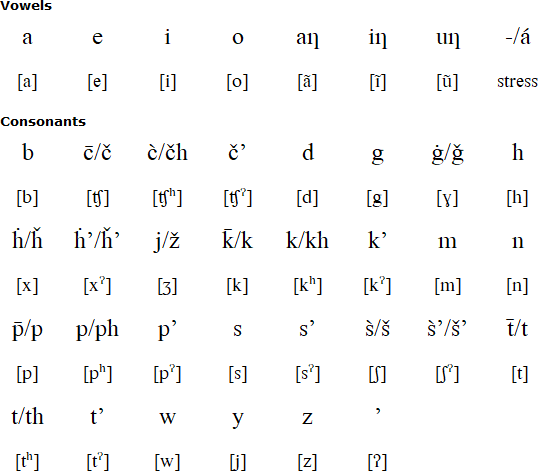Sioux
The Siouan languages are spoken in the USA and Canada by a total
of roughly 23,000 people. There is considerable mutual intelligibility
between these the Lakota and Dakota languages, but only relatively limited
intellibility between the other Siouan languages.
The name “Sioux” is a French version of the Ojibwa word nadewisou,
which means “treacherous snakes”. The native names for the Sioux mean
“An Alliance of Friends”, which is Dakhota in the Santee dialect,
Nakhota in the Yankton dialect and Lakhota in the Teton dialect.
There are a number of different spellings of these names.
The dialects of Sioux are:
Lakota (Lakhóta), spoken by about 9,000 people in seven tribes,
the Oglala, in the US states of Northern Nebraska, southern Minnesota, North and South
Dakota and northeastern Montana, and also in Canada
Western Dakota (Dakhóta), spoken by a few hundred people in
two tribes: the Yankton and Yanktonai.
Eastern Dakota (Dakhóta), spoken by a few hundred people in
four tribes: the Santee, Sisseton, Wahpeton and Wahpekute.
The two Nakoda languages (Assiniboi and Stoney) are not considered part of
the “Sioux” language as they are not mutually intelligible or politically
affiliated with the Sioux. They do belong to the Siouan language family,
as do many other languages.
Written Sioux
The first alphabet for Sioux, known as Riggs, was devised by the
missionaries Samuel and Gideon Pond, Stephen Return Riggs and Dr Thomas S.
Williamson in 1834. They based their spelling system on the Santee dialect
(Dakota) and used it to translate biblical texts into that dialect. The Dakota
translation of the bible was well known and used among the Dakota and Lakota.
A revised version of this system was used in Riggs’ Dakota Grammar, published
in 1852, and in his Dakota-English dictionary, published in 1890. Since then
a number of other Lakota and Dakota spelling systems have been devised, details
of which can be found at:
http://www.inext.cz/siouan/orthog.htm
Lakota pronunciation

Source: http://www.inext.cz/siouan/alphabet/alphabet.htm
Dakhota Sioux pronunciation (White Hat spelling)

Sample text in Dakota Sioux
The Deer Woman
Wičháša waƞ wayéi k´a tháȟča
núm wičháo kéyápi´. Taƞyéna
wičháphate č´a thadó kiƞ thašúƞke
k´iƞkhíye č´a waná wí khúčiyena
čhaƞkhé tiyátakiya kúyaƞka kéyápi´.
Mayá waƞ aphážežeyena asníkiya-iyotaka uƞkháƞ
akhótaƞhaƞ wíƞyaƞ waƞ mayá-akdákda
thahénakiya úyaƞka e waƞyák yaƞká
kéyápi´. Waná hihúƞni k´a wičháša
kiƞ isákhip hinážiƞ k´éyaš inína
yaƞká uƞkháƞ haƞkéya kičhí íyotake
č´a – Tokhe iyémayakiyešni se? Tókha uƞkháƞ
inína naƞká he? – eyé č´a íš iyá
mayá kiƞ éd hú ǧéǧeya íyotaka kéyápi´.
Part of a story called “The Deer Woman” written down by Ella Deloria
and in the Ullrich 1992 orthography
Source: http://www.languagegeek.com/siouan/y_dakotastory.html
– shows the same text in a number of different spelling systems
Sample texts in Lakota Sioux
Turtle Moccasin Boy
Hećeś hokśila wan kunśitku kićilaḣći
ti śke. Yunkan anpetu wan el kunśitku kin ćanḳin iyaya
ćanke hokśila kin iśnala tiyata yanke ćin ićunhan
hitunkala wan taku yaḳoġa-han ća naḣun keye.
Ḳeyaś he winuḣćala kin woyute mahel yuha kin hokśila
kin hehanhunniyan slolye śni keye. Ho, tka wana le naḣun kin un
wole yunkan wasna wan lila waśte kunśitku kin gnaka ća he e
ća hitunkala kin yuta-han keye.
Part of a story called “Turtle Moccasin Boy” written down by Ella Deloria
and in the Riggs 1852 orthography
Source: http://www.languagegeek.com/siouan/lakotastory.html
– shows the same text in eight different Lakota spelling systems
Man rescued by eagles
Eháŋni héčheš oyáte
waŋ igláka áyiŋ na waná
éthipi yuŋhĥáŋ wičháša
waŋ tĥawiču kiŋ hečíya:
“Winúĥča, itĥó wayé
mní kte ló, ” eyá.
Ečháš toháŋ waglí šni
héhaŋ éna thí po, ” eyá.
Translation
Long ago, the tribe was moving camp and were erecting their tipis
at the new place when a man said to his wife: ” Wife, I think I must
go out and hunt.”
So don’t move on with the tribe if they should go
on, but stay camped here until I return.”
An extract from “Man rescued by eagles” by George Bushotter
You can see the complete story at (with audio)
http://www.inext.cz/siouan/bushotter/bushotter.htm
Article 1 of the UDHR
Wičháša na wíŋyaŋ otóiyohi
iglúhapi na iyéhaŋyaŋ wówažapi.
Tȟaŋmáhel slol’íč’iyapi na kičhíwičhowepi
s’e kičhíčhuwapi kta héčha.
Translated into Lakota Sioux by Joe Bellman
Translation
Each and every man and woman is free and has equal rights to things. They are sure
of themselves in their mind, and they should treat each other as if they were siblings.
English version
All human beings are born free and equal in dignity and rights. They are endowed with
reason and conscience and should act towards one another in a spirit of brotherhood.
Article 1 of the Universal Declaration of Human Rights
